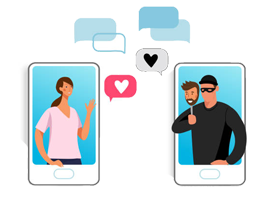Social Media Use & Social Engineering
In a new report from “We Are Social” and “Hootsuite”, the number of active social media users around the world was revealed to be 2.8 billion. That's billions of interconnected identities from all walks of life, posting and sharing information daily. As of June 2017, Zephoria Digital Marketing reported that just over 2 billion of these social media users were active on Facebook, with a staggering five new profiles created every second, and every day, they share 4.75 billion pieces of content. That's a lot of information connecting a lot of people and all of it can mean a serious impact on cyber security.

Most of us have either been the victims of social media hacking ourselves or know someone who has but what we often fail to consider is how a hacker could gain valuable information (or clues to gaining it) from access to the personal profiles of everyone connected to the hacked account. Think of that; even if your account is locked tight, any one of the "friends" in your social media circles could, in reality, be a hacker who has gained access to the information you've only shared about yourself with those closest to you.
What this means is that social media has become a hotbed of potential traps and threats in terms of cyber security. Anything you post could be used to gain deeper access to your own accounts and identity or those of your connections. For this reason, it has become critical that we all think twice before sharing any information that could compromise ourselves or anyone else, at work or at home. When we share anything online, it wouldn't be paranoid to assume, for the sake of safety, that one of the viewers will be a cybercriminal. If we restrict ourselves to posts that a cybercriminal couldn't use, we ensure that our social media lives don't lead to the compromise of our own or another person's information.
It's also a good idea to screen incoming connections thoroughly and friend requests on any social media platform. How many people blindly accept connection requests on LinkedIn, hoping that a larger number is more likely to impress those who view their profile? To stay safe, never accept a connection request from someone you don't know unless someone you do know can vouch for the stranger's identity and motives. The more you expose yourself to strangers, the greater the chance that you'll be unknowingly feeding them information about yourself and those in your social circles at work and at home.
Cybercriminals use stolen identities and hack social media accounts to climb a social ladder to greater and greater potential scores of stolen funds or sensitive information. Compromised social media profiles are no longer merely posing the threat of embarrassment or job loss, they pose a threat to the financial and information security of everyone connected to them. It is everyone's responsibility to use discretion on all social media platforms, from routinely changing their passwords to alerting connections of suspicious posts or activity. Remember, when it comes to cyber security, we're all in this together!
Tips for Safe Social Media Use:
- Practice smart
password management principles
- Enable two-factor
authentication
- Don’t share one-time security codes
- Give social media platforms as little information as
possible
- Recognize the warning signs of a stolen
account